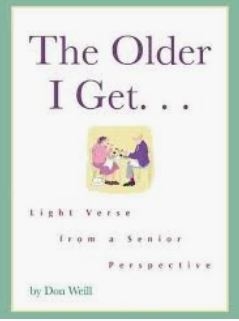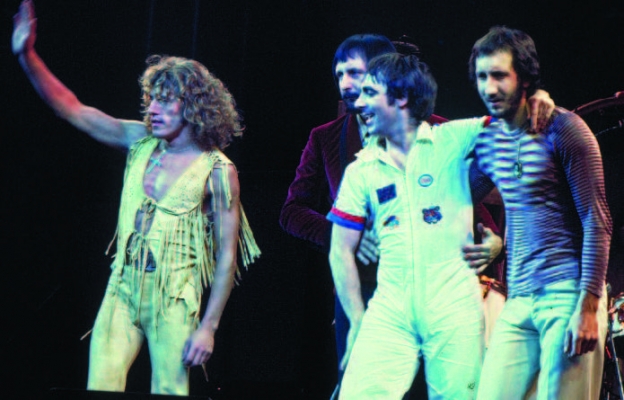Talking 'Bout my Degeneration
This is an elaboration of a Yizkor sermon I presented to my congregation – Ezra-Habonim, the Niles Township (Cook County, Illinois) Jewish Congregation – on Yom Kippur 5778. The Yizkor service and Yom Kippur itself prompt us to confront the forward march of years. They demand that we acknowledge and confront the inevitability of mortality. Our sages worked through this startling reality in Talmudic discussions and midrashim. My father processed it through poetry.
In "My Generation" the rock band "The Who" boldly declare, "I hope I die before I get old!" A couple of them sadly never got old, but songwriter/guitarist Pete Townshend and front man Roger Daltrey – well, they're still playing that song well into their seventies.
My father, Donald Weill, was clear about his feelings about getting old. He hated it. I once suggested that if he was upset about aging, he should blame his parents, for we are born to age.
I'm no longer so callow about the subject. Like my dad, I hate aging; I'm strenuously and categorically opposed. But what can I do? At 52, I'm pretty grey and, though I desperately try to stay in good shape, I've noticed that, on occasion, rising from the floor after sit-ups tends to be a three-part process from knees…to feet…to straightening the back.
Those of us in our middle ages and beyond cope with getting old in various ways. Some hide it, dying hair, tightening skin. Some fight it, popping supplements, joining gyms. Some defy it, acting 27 (or trying to) at 72. Others just let it happen, allowing gravity to take its toll. (One of my congregants, in his 60s, recently observed, "When you get older, everything goes south. Everything.")
My dad confronted aging in unique fashion. He wrote light verse poetry about it. Light verse was part of the rhythm of his life. As a child, he and his father would play a game. My grandfather would invent a line (e.g., "The meal was really quite delicious…") and my dad would have to complete it (e.g., "Now let's get up and do the dishes.")
When we were kids, my dad bade us good night not with lullabies, but with poems. "Gunga Din" and "If" by Rudyard Kipling were standards.
In 1977 my dad published "The Reluctant Investor", a collection of light verse poetry about his career in commercial real estate. It is the best book of light verse poetry about commercial real estate ever written.
Over the years, my father wrote journalistic articles, humor pieces, song lyrics, and more. But around the time he retired, he hunkered down and composed scores of poems about getting older.
He didn't just write. He researched, drafted, and edited. He tossed in the trash and began again. He tested themes, rhymes, and meters and would occasionally put a poem to the side and return to it years later. Donald Weill's work ethic was a lesson in persistence.
His files swelled with a veritable poetry trove on aging, an oeuvre on getting older, poems with titles like "Grandpa Wasn't Born This Way," "The Toys of Yesteryear," "Doctor, No Surprises, Please," "Musings of an Aging Athlete," and "I Had a Mid-Life Crisis," the punch line being that he could no longer recall the details of that crisis, as it occurred 30 years earlier.
Writing so many exactingly-rhymed, meticulously-metered, clever yet profound poems was an impressive achievement.
The next challenge was equally daunting – finding a publisher. A book of late-life musings in iambic pentameter does not possess mass market appeal. But persistence prevailed once again and in 2006, Running Press published "The Older I Get…Light Verse from a Senior Perspective" by Donald M. Weill. He was 76 years old.
My father had reason to be proud: a 56-year marriage to my mom, great relationships with his children and their families, his career, his tennis game, his country. But publishing a book of poetry about aging in his eighth decade – that surely offered him a special gratification. His dad would have been proud.
Old age imposes diminishments and humiliations, great and small. Wistfulness and perhaps some regret accompany senescence. But, as my father and many others have demonstrated, our later years may also yield productivity, gratification, and success.
My dad died in 2012. I miss him. But his book is a special legacy. As I continue to turn its pages, I hear my father's voice again. I marvel at his word-smithing, humor, and wisdom. And, if I myself am wise, I will heed his verses' deeper message by appreciating the accelerating march of my own passing years.
I conclude with "Lost at the Beach", the opening poem of "The Older I Get…Light Verse from a Senior Perspective".
When I was but a youngster
I knew of no more fun
Than heading for the seashore
And soaking up the sun.
With no protective lotion
To block the sun's bright rays
I frolicked by the ocean
In bygone summer days.
That carefree lad has vanished
That boy with cheeks so tan
And in his place you find me,
A very cautious man.
I'm under an umbrella
I'm sun-screened head to toe
I'm wiser, yes, but duller
Where did the old me go?
A youngster shouts, "Hey, mister!"
His beach ball rolled my way.
I pick it up and toss it back
To him . . . and yesterday.









Comments